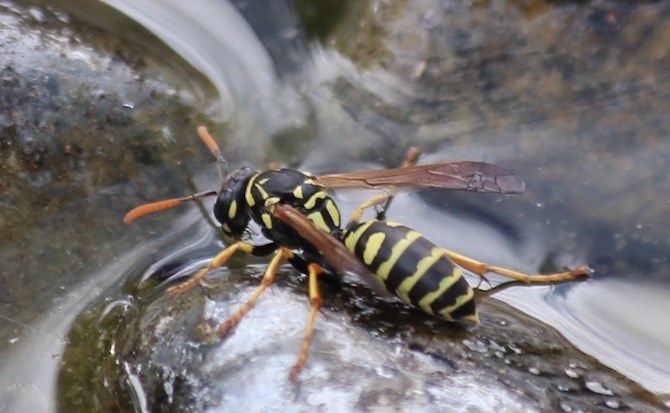
Japanese hornet or paper wasp? It's just not that easy to tell.
Image Credit: Ronald Wilson
September 03, 2019 - 7:00 AM
NORTH OKANAGAN - Its sting can be extremely painful and destroy hives of honey bees, but luckily talk of the Japanese Hornet's arrival to the North Okanagan is just that — talk.
Provincial apiculturist Paul van Westendorp told iNFOnews.ca there is no physical or photographic evidence of the Japanese Hornet in the North Okanagan.
The B.C. Ministry of Agriculture scientist said he was aware of the rumours and that since the confirmation of the Asian Hornet discovered at the Vancouver Harbour in May 2019, there had been "hundreds of inquiries" about the insects.
On Aug. 22 online news website Castanet reported the Japanese hornet had been spotted in the Okanagan Valley and the species had been confirmed in the Lower Mainland.
Van Westendorp said people have submitted pictures of the Elm Sawfly, a "very formidable-looking" wasp-like insect that is indigenous to B.C. and harmless to bees.
Plenty of photographs of the harmless but scary-looking Horntail have also been sent to the ministry over the summer.
UBC Okanagan Department of Biology entomologist Robert Lalonde said there were a number of insects that are large, harmless and common in B.C., and that sufficiently resemble hornets for someone who is not familiar with insects to jump to a wrong conclusion.
Lalonde said while it could be possible for an individual to be accidentally introduced, it would have to be a mated queen for an establishment to happen. Lalonde also said is Japanese hornets were established, their behaviour would give them away and mass attacks on honeybee colonies would have been seen.
Ed Nowek, owner of Vernon's Planet Bee Honey Farm, said he hadn't heard the Japanese hornet was in the Okanagan until the Castanet article.
Nowek said he hadn't seen one and as far as he knew no-one in bee keeping circles was talking about them.
Van Westendorp points out how difficult it is to identify species, even for scientists. The Asian hornet is a collective name of a number of species of large predatory wasps and when it was found at the Vancouver harbour in May it was initially identified as Vespa ducalis, but then subsequently reclassified as Vespa soror.
To contact a reporter for this story, email Ben Bulmer or call (250) 309-5230 or email the editor. You can also submit photos, videos or news tips to the newsroom and be entered to win a monthly prize draw.
We welcome your comments and opinions on our stories but play nice. We won't censor or delete comments unless they contain off-topic statements or links, unnecessary vulgarity, false facts, spam or obviously fake profiles. If you have any concerns about what you see in comments, email the editor in the link above.
News from © iNFOnews, 2019